
Current Research in Parasitology & Vector-Borne Diseases
Scope & Guideline
Bridging gaps between science and public health in parasitology.
Introduction
Aims and Scopes
- Parasitology Research:
The journal publishes studies that explore the biology, ecology, and epidemiology of parasites affecting humans and animals, with a focus on understanding their life cycles and transmission dynamics. - Vector Biology and Control:
Research on vectors, including ticks, mosquitoes, and sand flies, is a central theme. The journal emphasizes innovative vector control strategies and the ecological impacts of these vectors. - One Health Approach:
The integration of human, animal, and environmental health is a unique contribution of the journal, promoting research that highlights the interconnectedness of these domains in the context of infectious diseases. - Epidemiological Studies:
The journal covers epidemiological surveys that assess the prevalence, risk factors, and impacts of parasitic infections, providing crucial data for public health interventions. - Molecular and Genomic Techniques:
Studies utilizing molecular biology and genomic techniques to characterize parasites and vectors are prevalent, offering insights into genetic diversity and resistance mechanisms. - Public Health Implications:
Research that discusses the implications of parasitic and vector-borne diseases on public health policies, prevention strategies, and health education is a consistent focus.
Trending and Emerging
- One Health Initiatives:
Research incorporating One Health frameworks is on the rise, emphasizing the need for interdisciplinary collaboration to address the complexities of infectious diseases across human, animal, and environmental health. - Genomic Epidemiology:
The use of genomic tools to track and understand the spread of parasites and vectors is increasingly prominent, providing valuable insights into resistance mechanisms and transmission pathways. - Climate Change Impact Studies:
Emerging research focuses on the effects of climate change on the distribution and transmission of vector-borne diseases, highlighting the urgent need for adaptive public health strategies. - Citizen Science and Public Engagement:
The integration of citizen science initiatives for vector monitoring and disease reporting is gaining traction, reflecting a trend towards community involvement in public health. - Innovative Vector Control Strategies:
There is an increasing emphasis on novel approaches to vector control, including biocontrol methods and the use of transgenic organisms, to reduce disease transmission effectively. - Zoonotic Disease Dynamics:
Research on zoonotic diseases, particularly those emerging from wildlife reservoirs, is increasingly relevant, considering the growing interface between humans and wildlife.
Declining or Waning
- Traditional Chemical Control Methods:
Research focused solely on traditional chemical control methods for vector management has decreased, as the field increasingly emphasizes integrated and sustainable approaches. - Species-Specific Studies:
There has been a notable decline in studies concentrating exclusively on single species of parasites or vectors, with a shift towards understanding complex interactions and multi-species dynamics. - Historical Epidemiology:
Papers solely detailing historical epidemiological data without contemporary relevance or implications for current public health strategies appear to be waning. - Basic Morphological Studies:
Basic morphological studies that do not incorporate molecular approaches or ecological contexts are less frequently published, indicating a move towards more integrative methodologies. - Laboratory-Based Studies:
Research conducted primarily in laboratory settings, without field validation or real-world applicability, is becoming less common in favor of studies that emphasize fieldwork and practical implications.
Similar Journals

JOURNAL OF THE AMERICAN MOSQUITO CONTROL ASSOCIATION
Unveiling insights to protect public health from mosquito threats.JOURNAL OF THE AMERICAN MOSQUITO CONTROL ASSOCIATION is a premier journal dedicated to advancing the study and management of mosquito populations, critical for public health and environmental sustainability. Published by the American Mosquito Control Association, this journal boasts a robust interdisciplinary platform, encompassing essential research in Ecology, Insect Science, and Public Health, as evidenced by its placement in the Q2 and Q3 quartiles in these pivotal categories. Since its inception in 1985, the journal has provided valuable insights and methodologies related to mosquito control, vital for researchers and practitioners in the field. While it is not an open-access journal, its rigorous peer-review process ensures high-quality publications that significantly contribute to the ongoing discourse surrounding mosquito behavior, ecology, and management strategies. As the fight against vector-borne diseases continues, this journal serves as an indispensable resource for professionals and scholars aiming to develop innovative solutions to these pressing health challenges.
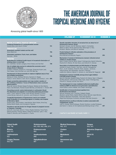
AMERICAN JOURNAL OF TROPICAL MEDICINE AND HYGIENE
Exploring the frontiers of tropical medicine since 1945.The American Journal of Tropical Medicine and Hygiene, published by the American Society of Tropical Medicine & Hygiene, serves as a pivotal platform for the dissemination of innovative research and clinical findings in the realm of tropical medicine and health. With an illustrious history dating back to 1945, this journal has maintained its commitment to enhancing global health, particularly in the fields of Infectious Diseases, Parasitology, and Virology. It currently boasts an impressive impact factor and ranks in the Q1 category for Parasitology and Q2 for Infectious Diseases and Medicine (miscellaneous), highlighting its academic prominence. The journal's mission is to advance research, showcase cutting-edge studies, and foster collaboration among researchers, healthcare professionals, and students dedicated to tackling tropical diseases and improving public health worldwide. While access is not open, the journal remains a critical resource for anyone looking to stay informed on the latest advancements in the field.
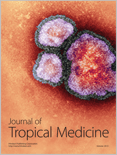
Journal of Tropical Medicine
Innovating solutions for tropical health challenges.Journal of Tropical Medicine, published by HINDAWI LTD, is a leading open-access journal dedicated to the dissemination of high-quality research within the field of tropical medicine. With an ISSN of 1687-9686 and E-ISSN 1687-9694, this journal has been providing an essential platform for researchers since 2009, facilitating a comprehensive understanding of diseases affecting tropical regions. Based in Egypt, the journal is categorized in the Q2 quartile for Medicine (miscellaneous) and Parasitology, alongside a Q3 rank in Microbiology as of 2023, highlighting its significant impact and relevance in these critical fields. The journal has earned commendable rankings within Scopus, being positioned 136th out of 636 in General Medicine, which reflects its role in advancing tropical health research. The Journal of Tropical Medicine is committed to promoting accessibility and knowledge sharing, making it an indispensable resource for professionals, researchers, and students dedicated to eradicating diseases and improving health outcomes in tropical settings.
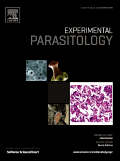
EXPERIMENTAL PARASITOLOGY
Pioneering Insights into Immunological Responses to ParasitesEXPERIMENTAL PARASITOLOGY, published by Academic Press Inc Elsevier Science, is a prominent journal in the domains of immunology, infectious diseases, and parasitology, with roots extending back to 1951. This journal, bearing the ISSN 0014-4894 and E-ISSN 1090-2449, serves as a critical conduit for sharing advancements in the understanding of parasite biology, host-parasite interactions, and the immunological responses elicited by parasitic infections. Although it currently operates under a subscription model without open access options, its rigorous scholarly content is vital for researchers and practitioners alike looking to stay informed on the latest developments and applications in the field. With a recent categorization as Q3 in key scientific categories, including Infectious Diseases and Parasitology, and a Scopus ranking solidifying its relevance, EXPERIMENTAL PARASITOLOGY is an essential resource for those committed to advancing knowledge and solutions to parasitic diseases.

MEMORIAS DO INSTITUTO OSWALDO CRUZ
Pioneering Insights for Global Health Challenges.MEMORIAS DO INSTITUTO OSWALDO CRUZ, published by the esteemed FUNDACO OSWALDO CRUZ in Brazil, serves as a vital platform for the dissemination of research in the fields of medicine and microbiology. With its inception dating back to 1909 as an open-access journal, it has made significant strides in promoting the understanding of health-related topics and infectious diseases across its diverse readership. This journal is recognized for its contribution to the scholarly community, boasting a Q2 category in Medicine (miscellaneous) and a Q3 rating in Microbiology (medical) as per the 2023 quartiles. Located in Rio de Janeiro, the journal not only embraces a rich historical context but also engages with contemporary issues in public health. Researchers and professionals in related fields will find valuable insights and data that underscore the significance of scientific collaboration in tackling global health challenges. With access to its archives spanning multiple decades, MEMORIAS DO INSTITUTO OSWALDO CRUZ remains a key resource for students and researchers alike as they endeavor to expand their knowledge and contribute to future innovations in health science.

MEDICAL AND VETERINARY ENTOMOLOGY
Connecting Insect Science with Public Health and Animal CareMEDICAL AND VETERINARY ENTOMOLOGY is a leading journal published by Wiley that focuses on the intricate relationships between insects and their roles in both medical and veterinary contexts. With an ISSN of 0269-283X and an E-ISSN of 1365-2915, this journal has established itself as an essential resource for researchers, professionals, and students alike, showcasing critical studies that advance our understanding of entomology's impact on public health and animal welfare. The journal spans from 1987 to 2024, indicating its long-standing contribution to the field, and it continues to maintain a strong reputation with an impressive categorization in the Q1 and Q2 quartiles across notable disciplines such as Insect Science and Veterinary Studies. While it is not an Open Access journal, its rigorous editorial standards and high impact factor make it a vital platform that attracts quality research in the ecology, evolution, and control of medically and veterinary important insects. As the field evolves, MEDICAL AND VETERINARY ENTOMOLOGY remains a pivotal asset for scholars striving to tackle current challenges and improve strategies in entomological research.
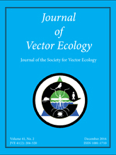
JOURNAL OF VECTOR ECOLOGY
Unraveling the Complexities of Vector EcologyJOURNAL OF VECTOR ECOLOGY, published by SOC VECTOR ECOLOGY, serves as a pivotal platform for the dissemination of research in the interdisciplinary fields of ecology, evolution, behavior, and systematics. Established in 1996 and operating from the United States, this esteemed journal boasts an impressive Q2 ranking in Ecology as of 2023, showcasing its significant contribution to the scientific understanding of vector ecology and its implications on public health and environmental management. The journal is indexed in Scopus, ranking #341 out of 721 in Agricultural and Biological Sciences focusing on Ecology, Evolution, Behavior and Systematics and #222 out of 461 in Environmental Science, highlighting its relevance and impact within these domains. Although it does not currently offer open access options, the JOURNAL OF VECTOR ECOLOGY remains committed to advancing knowledge and fostering collaboration among researchers, professionals, and students dedicated to vector analysis and control strategies.
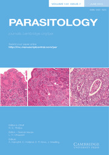
PARASITOLOGY
Navigating the intricate world of parasites and hosts.PARASITOLOGY, published by Cambridge University Press, is a prestigious journal that has been at the forefront of research in the field of parasitology since its inception in 1908. This esteemed publication carries the ISSN 0031-1820 and E-ISSN 1469-8161, and its rigorous peer-reviewed articles provide insights into both fundamental and applied aspects of parasitic biology, infectious diseases, and host-parasite interactions. With a commendable impact factor, PARASITOLOGY ranks in the top quartile (Q1) for Animal Science and Zoology and holds Q2 rankings in both Infectious Diseases and Parasitology categories, indicating its significant influence and contribution to these disciplines. The journal's diverse scope allows for a broad range of research articles, reviews, and case studies, making it an essential resource for researchers, professionals, and students seeking to stay updated on the latest developments in the field. Based in the United Kingdom, PARASITOLOGY offers valuable access to critical research in an era where understanding parasitic diseases is more vital than ever, and continues to shape the future of this important scientific field.
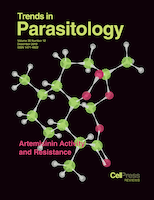
TRENDS IN PARASITOLOGY
Advancing the frontiers of parasitology research.TRENDS IN PARASITOLOGY is a premier academic journal published by CELL PRESS, focusing on the dynamic field of parasitology and infectious diseases. With an ISSN of 1471-4922, this esteemed journal is recognized for its high impact within the research community, boasting a Q1 ranking in both the Infectious Diseases and Parasitology categories as of 2023. This places it among the top-tier journals in the field, as evidenced by its remarkable Scopus rankings, where it ranks #3 out of 79 in Parasitology and #29 out of 344 in Infectious Diseases. Spanning over two decades of scholarly contributions from 2001 to 2024, TRENDS IN PARASITOLOGY emphasizes the latest advancements, challenges, and innovative methodologies in parasitology, making it an invaluable resource for researchers, healthcare professionals, and students alike. With an increasing focus on open access initiatives, this journal not only promotes widespread dissemination of knowledge but also encourages collaboration across the global scientific community. Whether you are investigating novel interventions, exploring parasite evolution, or understanding host-pathogen interactions, TRENDS IN PARASITOLOGY remains at the forefront of research, driving forward the understanding of parasitic diseases.

Current Tropical Medicine Reports
Fostering collaboration for a healthier world.Current Tropical Medicine Reports, published by Springer, is an esteemed journal that serves as a pivotal platform for researchers, professionals, and students in the fields of immunology, allergy, and infectious diseases. With a strong focus on emerging tropical medicine topics, the journal provides an authoritative avenue for disseminating innovative research and practical insights, showcasing its commitment to advancing global health knowledge. Now in its convergence years from 2014 to 2024, it has successfully established itself in the academic community, evidenced by its Q2 rankings in the categories of Infectious Diseases and Immunology and Allergy in 2023, reflecting its impact and relevance. The journal boasts impressive Scopus rankings, holding the 50th position in Infectious Diseases and 55th in Immunology and Allergy, further underscoring its significance in these critical fields. While it operates under a subscription model, the journal serves not only as a resource for published research but also as a catalyst for collaboration and knowledge exchange among the scientific community. With a growing readership, Current Tropical Medicine Reports is poised to continue shaping the discourse surrounding tropical health challenges.